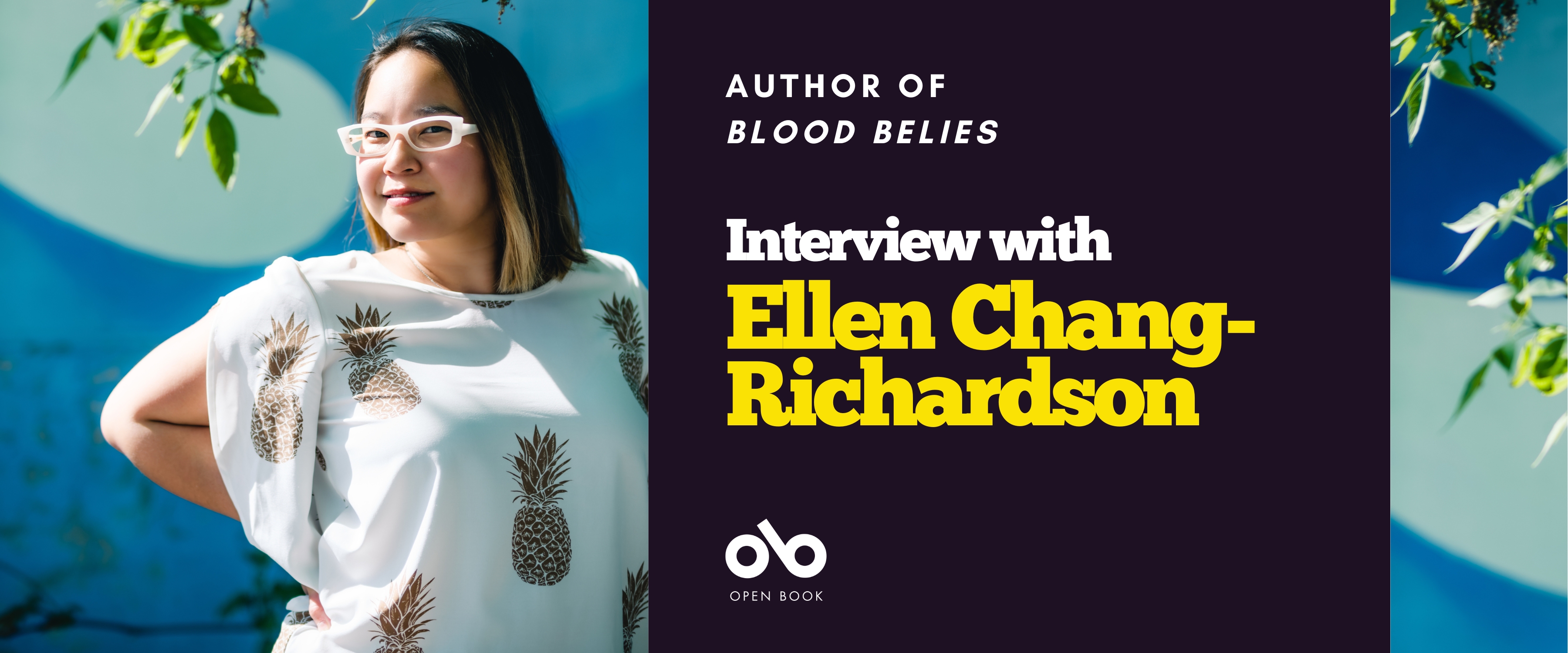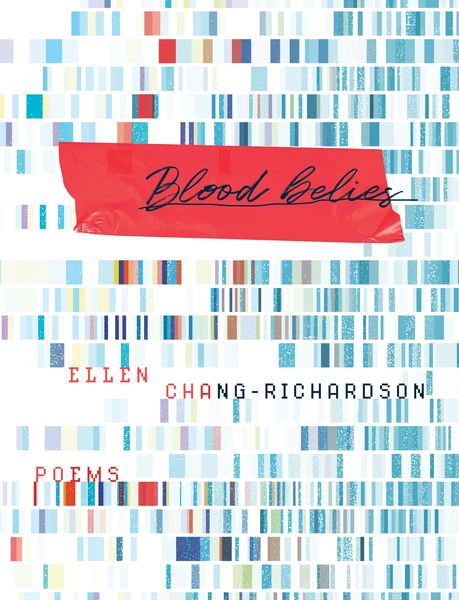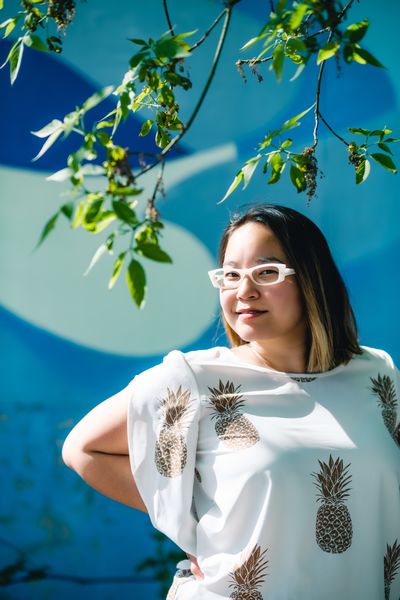Ellen Chang-Richardson Confronts the Past and Perseveres in Their Debut Poetry Collection
While an author may carry scars from the past, and from wrongs done to their family and ancestors, they are not always visible or clear. Sometimes, they even become so familiar that the author finds them simply blending in. But it may only take one event or experience to bring all of these scars and injuries into stark relief.
After stumbling across Canada’s Report of the Royal Commission on Chinese and Japanese Immigration, Sessional Paper No. 54. A. 1902, back in 2020, poet Ellen Chang-Richardson found that the injustices and acts of racism catalogued in those pages dredged up painful feelings that had long been held down. But, instead of simply being overwhelmed by this response to those hurtful truths, the author set about trying to face and perhaps reconcile with them.
Through the poems in Blood Belies (Wolsak & Wynn), Chang-Richardson's debut collection, the author draws on their own experiences and explorations of self to confront the past and to find a way forward through art and expression. The result is a stirring book that delves into issues of race, injury and belonging, and that is sure to speak to readers who have been forced to carry scars of their own.
Check out this moving Line and Lyric interview with Ellen Chang-Richardson, where the author talks about their new book of poems and fascinating discoveries that they made in writing it.
Open Book:
Tell us about this collection and how it came to be.
Ellen Chang-Richardson:
It was 2020 and I had just stumbled across Canada’s Report of the Royal Commission on Chinese and Japanese Immigration, Sessional Paper No. 54. A. 1902. I’m not sure how many people know this (I didn’t at the time) but the Government of Canada has an ongoing electronic catalogue of over 570,000 publications documenting the inquiries, ruminations, and actions of this country throughout its 157-year existence. That sessional paper was one of those instances—a report turned exclusionary legislation becomes fuel for “justified” racism.
Reading the 430-page document brought up bile and dredged up feelings I had worked so hard, for so long, to tamp down. I didn’t quite know what to do with my emotions so I stewed. Then I began thinking, how can I work through this? How can I sift through the past instead of trying to forget it? Can I embrace it? Reconcile it? Put that good work towards a different future, for myself as well as others? And so I cobbled something together. I added poems. I went digging through the archives. I spliced other poems. I examined the wider history. I unearthed my family’s stories. I wove our memories and our lineage through. Blood Belies emerged from the paperwork.
OB:
Can you tell us a bit about how you chose your title? If it’s a title of one of the poems, how does that piece fit into the collection? If it’s not a poem title, how does it encapsulate the collection as a whole?
ECR:
Kaveh Akbar has an encouragement I love which is to find the “bay leaf” in your poems. The title, Blood Belies, is the bay leaf of this collection. In an earlier version of the manuscript there was a poem with the line “…full of brimstone and the belief I belong; existence that blood // belies…” but the poem itself didn’t seem to fit with the rest of the collection. It was too harsh, too angry.
Your CanLit News
Subscribe to Open Book’s newsletter to get local book events, literary content, writing tips, and more in your inbox
So I plucked it out and held on to its sentiment instead.
When it comes to social class and the antiquated ideas that hold up their structures, the “purity” of one’s blood equates to the status that person is granted. Yet, blood belies. The truth is, we are all of the same beating heart—the same flesh, bone, liquid, shit—it’s the misguided concepts of what blood entails that deceive us.
OB:
What was the strangest or most surprising part of the writing process for this collection?
ECR:
Realizing that I could craft visually interesting poems based on ambient music. Then realizing, in turn, that the markings made on the page as a result of that process reflected how my brain felt during a post-concussion flare up. “base notes hit the edge of a high” is a ten-part poem that runs undercurrent to the collection. It explores the ebbs, glitches, and flows that come from living with long-term post-concussion syndrome.
OB:
Who did you dedicate the collection to and why?
ECR:
Blood Belies is dedicated to “those who look like me” and “those who live between.” While a number of core pieces deal with anti-Asian racism and pan-Asian culture, the collection as a whole interlaces memory fragments, climate anxiety, invisible disabilities, and above all else, hope. These are relatable things. We do indeed live in a dangerous time and, as Carrianne Leung beautifully penned, “we need audacity in order to rewrite the world.”
OB:
For you, is form freedom or constraint in poetry?
ECR:
I think it’s important to understand the constraints of poetic form. As in all applied study—science, visual art, theatre, music, maths—understanding the fundamentals forms the basis for skillful creation.
In poetry, understanding syllabic structure, genre, enjambment, stanza arrangement (to name a few), and how your choices will influence the reading of a piece, is integral. But then actively breaking these rules—playing with them, seeing what you can do, and how far you can push—is poetic freedom.
OB:
What are you working on next?
ECR:
A collection of ekphrasis (poetry about visual art) featuring select contemporary artists—working across photography, film, installation, and performance—who have affected the trajectory of art history in an international context.
___________________________________________________
Ellen Chang-Richardson is an award-winning poet of Taiwanese and Chinese Cambodian descent whose multi-genre writing has appeared in Augur, The Fiddlehead, Grain, Plenitude, Watch Your Head: Writers and Artists Respond to the Climate Crisis, The Spirits Have Nothing to Do with Us: New Chinese Canadian Fiction and others. The co-founder of Riverbed Reading Series, they are a member of Room’s editorial collective, long con magazine’s editorial board and the creative poetry collective VII. They are represented by Tasneem Motala at the Rights Factory and currently live on the traditional unceded territory of the Algonquin Nation (Ottawa, Canada).






